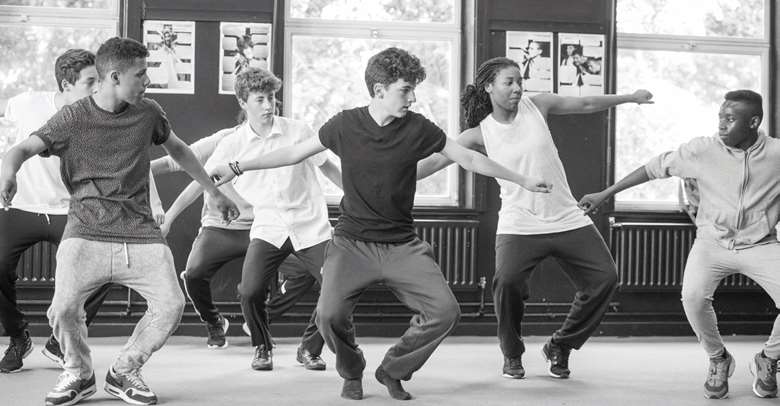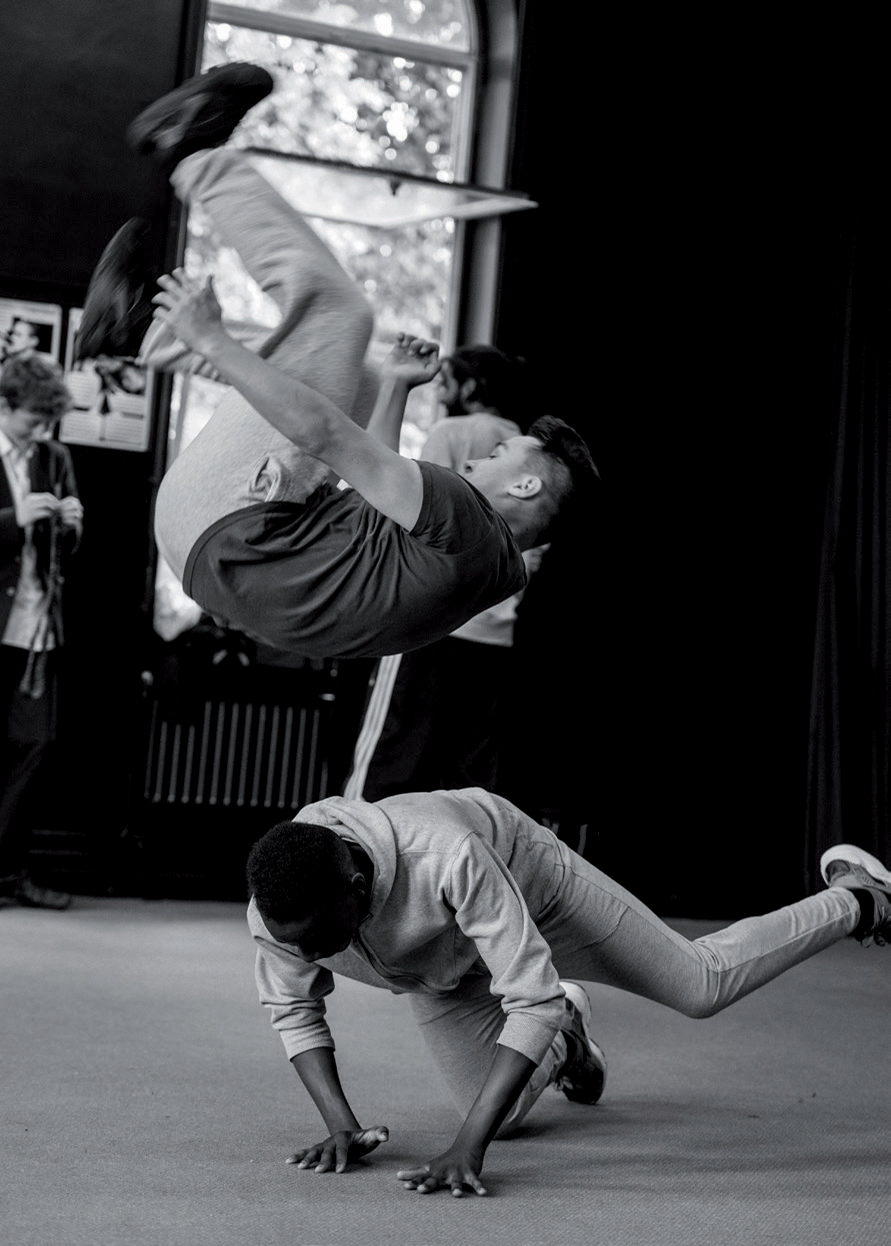Firm prospects? The future of post-16 performing arts
Harriet Clifford
Thursday, March 25, 2021
Following the DfE's open consultation about the future of post-16 qualifications, including technical and vocational courses, Harriet Clifford unpicks what the plans mean for performing arts, and speaks to the experts: drama teachers

All photos: Simon Adrians Tangle Photography
Drama & Theatre's most-read online story, gaining more than double the number of views of the next most-visited page in the last 90 days, was: ‘Performing Arts BTEC could be scrapped in post-16 qualifications reform’ (14 January 2021). This was not breaking news, and many a savvy drama teacher had long-before taken to social media upon discovering the Department for Education's proposals.
However, the potential reform was by no means common knowledge, and had easily slipped under the radar for many of us until the headlines and subsequent responses appeared. It is unsurprising, given the constant onslaught of news and announcements we have to deal with, that most of us don't check gov.uk on a daily basis (plus, it's such a clunky website that you probably couldn't find anything even if you wanted to).
Either way, whether we knew about it from day one or not, on 31 January 2021 the DfE closed its open consultation for the second stage of its ‘Review of post-16 qualifications at level 3 in England’, extending the deadline from the initial date of 15 January.
What is the proposal?
In a nutshell, the reform aims to ensure that all qualifications give students skills for employment or further study, as well as removing the ‘bewildering choice’ that students and employers face when considering options at level 3. The document's foreword points out that there are currently more than 12,000 different qualifications funded in England at level 3 and below.
In some ways, this seems sensible. Young people (and their teachers) have enough decisions to make, and research has shown that too much choice actually reduces satisfaction in what we do eventually choose. Plus, anything that claims to increase young people's employability must surely be worth considering.
To this end, the DfE is proposing that 16-to 19-year-olds wanting to study a technical subject can choose from 24 ‘T Levels’ – equivalent to three A Levels and providing in-depth technical training – and ‘additional specialist qualifications’ that can be studied alongside A Levels.
What this means for drama
On the list of 24 T Levels, which started to come into effect in 2020 and are due to gradually be made available up until 2023, there are no qualifications in performing arts. At a push, the closest is perhaps Media, Broadcast and Production, which is in the ‘September 2023 onwards’ stage of launch, but there are no details beyond the title of this course currently available.
The additional qualifications that the DfE is proposing to fund alongside A Levels and T Levels include ‘small qualifications in performing or creative arts’, which are described as being academic, and must be ‘valued’ by specialist Higher Education providers. Performing arts graded qualifications are also mentioned as something to be taken alongside a student's main study programme to support HE progression without forming ‘the core aim’.
Although not stated outright in the document, this means that BTEC Performing Arts, RSL Vocational Awards, and UAL performing arts qualifications, among some others, would no longer be funded. Defunding means that qualifications may continue to exist, but few schools and colleges will be able to afford to offer them.
There is uncertainty over whether Cambridge Technicals (CTs) in Performing Arts will continue to be funded. Speaking to the lead moderator for the CT in Performing Arts, Kim Jackson, he explains: ‘My understanding from the OCR submission is that because the CTs are “Applied Generals” and not Technicals (confusingly), they may run alongside A Levels after the demise of other existing technical qualifications. This is OCR's current position anyway.’
He continues: ‘The CTs are hybrid courses and offer a mix of vocational and “academic” approaches. That's the point of them being Applied Generals, although it may be that the subtlety of the Technical/Applied General distinction is lost overall in the process. In a mixed programme of A Levels and CTs, the CTs offer the practical components that will enable the basis for further training in the Arts at FE or HE, or specialist school level.’
 Coombe Sixth Form – BTEC Extended Diploma in Performing Arts: Dance workshops with Boy Blue Entertainment
Coombe Sixth Form – BTEC Extended Diploma in Performing Arts: Dance workshops with Boy Blue Entertainment
What do teachers think?
As is clear from the number of page views, comments and shares of this story, Drama teachers, organisations and students have been outspoken in their disagreement with this proposed reform. National Drama issued a full response outlining their dissatisfaction with the proposal, stating that the organisation believes this will ‘limit access, inclusion, and opportunity to all learning but especially disadvantaged and under-represented communities’.
Tom Kirkham, former head of Drama at More House School in Farnham, was ‘hugely disappointed’ on learning about these plans and thinks that they will ‘undoubtedly’ mean that some students are excluded from post-16 performing arts study. He highlights those students with specific educational needs such as dyslexia, who, he says, ‘often thrived on the practical nature of the courses’ and demonstrated genuine ability.
Responding to the claim that the changes will mean that ‘all technical qualifications should offer the firm prospect of a sustainable job and career’, Kirkham refers to the ‘ageold argument’ about whether education and learning are only of value if they directly result in a job.
He continues: ‘People will make up their own minds about this, but in my own experience, my English degree did not lead into a particular job or career, but has been of the utmost value to me throughout the course of the 20 years since I completed it.’
Commenting on the same statement about job prospects, Victoria Harrocks, who teaches BTEC Performing Arts at Formby High School, says, ‘Our recent alumni have continued to degree level courses in English, Drama and Law, as well as theatre jobs and creative apprenticeships. Arts, entertainment, and cultural activities contributed £10.47 billion to UK economy in 2019 and the creative industries sector is growing five times faster than the national economy.
‘A performing arts BTEC aligns itself to meet the needs of the performance industry, emphasises creativity and practices skills in leadership and this structure directly enables our young people to become socially mobile and sustain a job or a career in a variety of industries.’
I ask Harrocks about the claim that the proposal removes overlaps with A Levels. She says, ‘A Level and BTEC are contrasting qualifications in arts subjects and, having experience of delivering both, I don't believe that the two qualifications overlap.
‘Arts A Levels are qualifications designed predominantly for academic study, and arts BTECs are practice-based qualifications. Not all students can access the academic rigour that A Levels demand and many students flourish through BTECs by learning a greater depth of practical skills.’
According to Kim Jackson, ‘It has never been possible to assert that any training programme in Performing Arts would lead to a “firm prospect of a sustainable job and career”. Generally, what PA courses have done is offer a flexible and adaptable skillset that enables graduates to plan and sustain a freelance career in a range of employment opportunities.’
The value of BTECs
When I ask both Kirkham and Harrocks for a few reflections on their personal experience of teaching BTECs, I am met with unanimous enthusiasm. For Kirkham, the BTEC is ‘an excellent course, with huge breadth of units allowing teachers to work to the interests of the students as well as to their own skillset’, and, of course, the students loved it.
Harrocks agrees, saying that the BTEC Level 3 Extended Certificate in Performing Arts she teaches is ‘varied’, including practical elements such as devising, live and recorded performance opportunities, the development of skills in multiple genres and industry related presentations.
‘Students are challenged throughout each unit and this specification is designed to encourage creativity, independent thinking and problem solving, skills which help our young people to transition into higher education, the workplace, or apprenticeships.’
 Coombe Sixth Form – BTEC Extended Diploma in Performing Arts: Production of Macbeth staged at the Rose Theatre, Kingston Upon Thames
Coombe Sixth Form – BTEC Extended Diploma in Performing Arts: Production of Macbeth staged at the Rose Theatre, Kingston Upon Thames
Final thoughts
The public consultation is now closed, and there is no published date for when final decisions will be made or announced. Considering the fierce passion expressed by teachers, both in my conversations, and on social media, it seems that the DfE may have been inundated with concerns about the consequences of defunding vocational options in performing arts.
Jackson, Harrocks and Kirkham have varying views on the new T Levels, mostly highlighting the obvious fact that performing arts isn't even close to being an option, but Kirkham believes that they are ‘another thing that will come and go in due course’. We'll have to wait and see.
Indeed, all teachers can do about any of this now is wait, continuing to dedicate themselves to those students who are fortunate enough still to have these qualification options. In a worst-case scenario, young people will adapt – they always do – and teachers will undoubtedly find extraordinary and innovative ways to support all young people in viable and accessible performing arts pathways.

